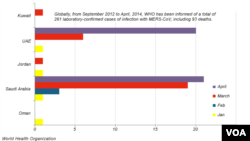GENEVA —
The World Health Organization (WHO) says it believes the recent spike in cases of Middle East Respiratory Syndrome, or MERS Corona virus is probably due to a seasonal increase of the disease rather than to any changes in the behavior of the virus.
WHO says similar upsurges have occurred around the same time in the past two years.
WHO spokesman Gregory Hartl says the increase in cases is most likely due to the warmer weather in the Arabian Peninsula and to outbreaks of the disease in two or three hospitals in Saudi Arabia and the United Arab Emirates.
He says health officials do not know how the virus is transmitted from person to person. But it is clear, he says, the disease does not spread with the same ease that Severe Acute Respiratory Syndrome, or SARS, did.
“We do not think it does transmit very efficiently," said Hartl. "It certainly is not anything like SARS or like diseases like influenza…There is no way we can predict the future. But, for us, at the moment, certainly this virus MERS does not have the ability to infect in the same way that SARS did. So, that is a good sign.”
Hartl says SARS is highly contagious. The disease broke out in China, Hong Kong and Taiwan in the early 2000s. Over a six-month period, at the height of the epidemic, nearly 8,100 cases and 774 deaths were reported.
By comparison, Hartl notes WHO has confirmed 261 cases of MERS corona virus in two years. But, the downside is that 93 people have died, which is a much higher fatality rate than that of SARS.
The MERS corona virus is shrouded in mystery. Health officials know that camels are one of the hosts of the virus, but they believe the disease may also stem from other sources. They also do not know why some humans get infected and others do not.
The virus made its first appearance in Egypt last week. Cases also have been confirmed in Greece, Malaysia, the Philippines and Indonesia. But WHO spokesman Hartl says patients in those countries acquired the disease while they were in Saudi Arabia. He says the virus remains largely contained in the Middle East.
He says the virus has not changed its character. Thirty viruses have been tested, he says, and none have mutated.
“These viruses do not transmit from human to human because when they transmit from human to human, small changes in the genome of the virus will occur," said Hartl. "However, in this case, we believe that this means that almost all the introductions still are coming from the environment somehow.”
Hartl says health officials are faced with the big challenge of trying to figure out how the virus passes from its natural host or reservoir to humans.
The World Health Organization says in the absence of any drugs to treat the disease, the best way people can protect themselves from falling ill is to practice good general hygiene. WHO says people should wash their hands frequently and keep their distance from people who show signs of MERS.
WHO says similar upsurges have occurred around the same time in the past two years.
WHO spokesman Gregory Hartl says the increase in cases is most likely due to the warmer weather in the Arabian Peninsula and to outbreaks of the disease in two or three hospitals in Saudi Arabia and the United Arab Emirates.
He says health officials do not know how the virus is transmitted from person to person. But it is clear, he says, the disease does not spread with the same ease that Severe Acute Respiratory Syndrome, or SARS, did.
“We do not think it does transmit very efficiently," said Hartl. "It certainly is not anything like SARS or like diseases like influenza…There is no way we can predict the future. But, for us, at the moment, certainly this virus MERS does not have the ability to infect in the same way that SARS did. So, that is a good sign.”
Hartl says SARS is highly contagious. The disease broke out in China, Hong Kong and Taiwan in the early 2000s. Over a six-month period, at the height of the epidemic, nearly 8,100 cases and 774 deaths were reported.
By comparison, Hartl notes WHO has confirmed 261 cases of MERS corona virus in two years. But, the downside is that 93 people have died, which is a much higher fatality rate than that of SARS.
The MERS corona virus is shrouded in mystery. Health officials know that camels are one of the hosts of the virus, but they believe the disease may also stem from other sources. They also do not know why some humans get infected and others do not.
The virus made its first appearance in Egypt last week. Cases also have been confirmed in Greece, Malaysia, the Philippines and Indonesia. But WHO spokesman Hartl says patients in those countries acquired the disease while they were in Saudi Arabia. He says the virus remains largely contained in the Middle East.
He says the virus has not changed its character. Thirty viruses have been tested, he says, and none have mutated.
“These viruses do not transmit from human to human because when they transmit from human to human, small changes in the genome of the virus will occur," said Hartl. "However, in this case, we believe that this means that almost all the introductions still are coming from the environment somehow.”
Hartl says health officials are faced with the big challenge of trying to figure out how the virus passes from its natural host or reservoir to humans.
The World Health Organization says in the absence of any drugs to treat the disease, the best way people can protect themselves from falling ill is to practice good general hygiene. WHO says people should wash their hands frequently and keep their distance from people who show signs of MERS.





